John Hurrell – 20 December, 2023
In this scintillating concoction, sixteen brilliant contemporary artists are strutting their stuff with thirty works from the AAGTOT/Chartwell holdings, each individually full of surprises and compelling, while also rarely interconnecting with others because of the diverse range of themes. The conceptual fragmentation in this smorgasbord doesn't really matter.
Auckland
Billy Apple, Berlinde de Bruyckere, Fiona Connor, Claire Fontaine, Ryan Gander, Zac Langdon-Pole, Goshka Macuga, Peter Peryer, Pauline Rhodes, Natalie Robertson, Julian Rosefeldt, Ann Shelton, Angela Tiatia, Francis Upritchard, Haegue Yang, Anicka Yi
Portals and Omens: New Work from the Collection
Curated by Natasha Conland
21 October, 2023 - 7 July, 2024
Out of the blue (no warning) we find a stunning Collection show on the top floor that is the most exciting Collection exhibition Auckland Art Gallery Toi o Tāmaki has had since Natasha Conland selected works from the Melbourne based Naomi Milgrom Collection ten years ago. In this scintillating concoction, sixteen brilliant contemporary artists are strutting their stuff with thirty works from the AAGTOT/Chartwell holdings, each individually full of surprises and compelling, while also rarely interconnecting with others because of the diverse range of themes. The conceptual fragmentation in this smorgasbord doesn’t really matter.
Zac Langdon-Pole’s A Quiver of Names, is a wooden cabinet of drawers that has a typewriter on top with assorted tribal arrow heads replacing its keys. This conflated punning of ancient hunting tools, thinker’s fingertips, and old-fashioned typewriter keyboard, suggests how language is used to classify, describe and communicate as part of our thinking processes, to pierce the constant ‘cloud of unknowing’ that surrounds us every day, as we look at the past and mentally attempt to analyse and negotiate our way through the present and future.
Francis Upritchard‘s giant stick insect at the top of her sloping ramp—leaning against the wall—seems to be a laugh about the conventions of muscle-toned masculinity, a term for a weedy dork in contradistinction to poor old Sisyphus’ constant suffering and ineffectual exertion as condemned by Hades—that we see below. His wasted, eternally utilised, brute strength can never bring happiness or resolution.
Also highly evocative is Anicka Yi‘s installation Half Water, Half Mud, Half Sun, that presents bumping whirling ‘moths’ trapped in five cocoonlike lampshades made from thin kelp, and five reflecting mini-whirlpools embedded in the organic Arp-like ‘beach’ floor below. The golden translucent colour of the suspended ‘suns’ hints of radiating fiscal power, and the containers of bumbling insects fragile hermetic eco-systems, slowly collapsing.
Enclosed in a bay, Haegue Yang’s suite of six large wall and floor-based photo-collages (Alien Colloquial) surround her freestanding spherical sculpture on wheels, Sonic Sphere (Diagonally Ornamented Copper and Nickel) that is densely packed with horizontal, diagonal and vertical lines of shiny metallic balls. Yang’s bold, highly inventive, Bauhaus-influenced collages in my view are easily the highlight of the show, and should attract a healthy audience to her current survey in New Plymouth.
Pauline Rhodes‘ gorgeous sequence of leaning bright red or ‘rusted’ plywood shapes and wrung-out, twisted,silk ‘cords’ on the floor (accompanied by Matagouri cuttings from the beaches of Banks Peninsula, desolate sites where she runs regularly), generates quick emotional responses through its intensely saturated colour and dynamic abstract form: pure unabashed body-friendly sensuality accompanied by ecological awareness.
For those of a more literary persuasion, who enthuse over speculative verbal flows of discursive language rather than evocative narrative-based or abstract formalist imagery, Ryan Gander‘s talking mouse, ensconced within the litter of a recently chewed-out wall hole, articulates a string of semi-coherent arguments through the voice of the artist’s young daughter Olive.
While Gander’s contribution is obliquely and partially about the pleasures of fatherhood and devising a spoken text about the mammalian imagination vis-à-vis an awareness of time, creating a work where humour is infectious (like Upritchard’s), it is also a salient contrast to the foreboding Gothic ambience of Berlinde de Bruyckere‘s towering sculpture, Arcangelo 1, where an anguished tippy-toed figure (with hidden arms and face) is draped in cascading pieces of ragged animal pelt—a violent substitute for ashes and sackcloth. A timeless dramatic monument to grief in the Covid era.
John Hurrell
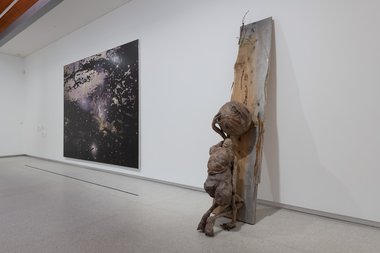

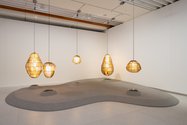
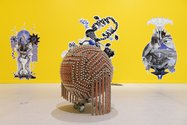
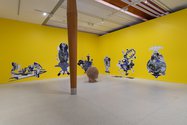
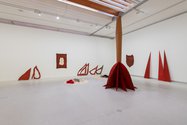
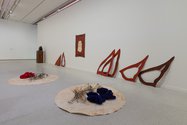
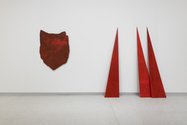
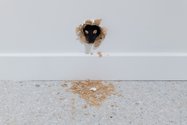
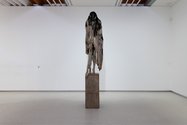
 Two Rooms presents a program of residencies and projects
Two Rooms presents a program of residencies and projects Advertising in this column
Advertising in this column



This Discussion has 0 comments.
Comment
Participate
Register to Participate.
Sign in
Sign in to an existing account.